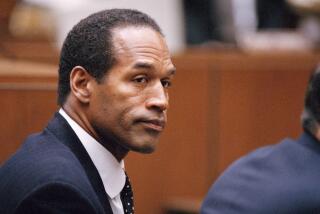Espy Acquittal Is Not a Total Victory
- Share via
The acquittal of Mike Espy, President Clinton’s former Agriculture secretary, on bribery charges is cause for joy and regret.
He did not take the cheap and easy way out to win victory by claiming that as the first African American to head the Department of Agriculture he was the victim of a racially motivated plot by Republicans to discredit African American political leaders. Before his trial, some expected him to play the race card.
That thinking is understandable since some black politicians, when under legal fire, have quickly latched onto the issue of race to deflect attention from their crimes. One has only to remember that former Illinois Rep. Mel Reynolds screamed racism when he was indicted, tried and convicted of sexual assault charges. Washington Mayor Marion Barry screamed racism when he was indicted, tried and convicted on a drug charge. Rep. Walter R. Tucker III (D-Compton) screamed racism when he was convicted of bribery.
Even though their knee-jerk cries of white persecution didn’t fly, they played the odds and reminded blacks that Ronald Reagan’s Justice Department initiated dozens of corruption probes against black elected officials during the 1980s. Given the Reagan administration’s open hostility to civil rights and social programs, it’s easy to believe that some of these cases walked, if not outright crossed over, the thin line between legitimate concern with bagging lawbreakers and racially motivated political harassment of black leadership.
Yet by even winding up on a court docket, Espy’s triumph must be tempered with the regret that he has further tarnished the image of black political leaders. If this seems like a demand that black politicians be cleaner in their political dealings than white politicians, there’s a reason.
Black politicians have a special duty to the black communities. Many blacks view them not as politicians, but as leaders and advocates. They look to them to represent their interests and to challenge and confront institutional power. When they take bribes or are even accused of taking them, they betray the trust of African Americans.
Many black politicians are not newcomers to politics. Most are long-term Democratic Party veterans who know well the political ropes. Espy was a three-term congressman from Mississippi before he took the Agriculture post in 1993. If it had been shown that he actually took bribes or committed other illegal acts, then he did it because he thought he could get away with it and not out of any babe-in-the woods naivete or innocence. Espy didn’t dispute the charge that he took gifts from friends and businesses, but insisted that they were given and accepted out of friendship and not in return for political favors.
Even though a jury believed his claim, that still means he felt that his office and position conferred upon him a special privilege and that gift-taking came with the turf.
The failed prosecution of Espy proved that he was not a victim of white persecution or a corrupt politician. But it also proved that the political dealings of black politicians will and should be watched and scrutinized just as closely as those of white politicians.
More to Read
Get the L.A. Times Politics newsletter
Deeply reported insights into legislation, politics and policy from Sacramento, Washington and beyond. In your inbox twice per week.
You may occasionally receive promotional content from the Los Angeles Times.










